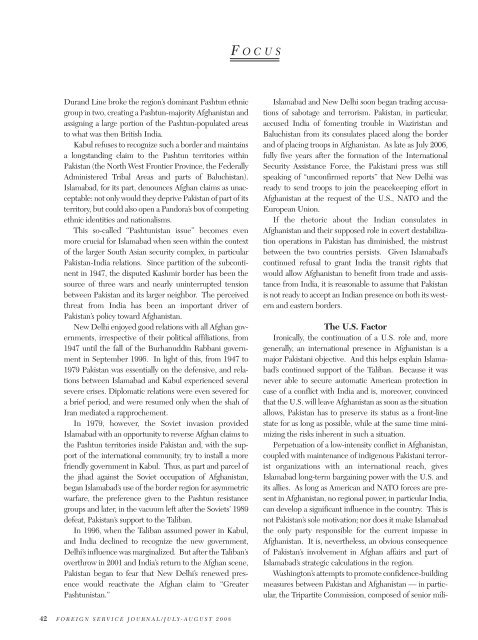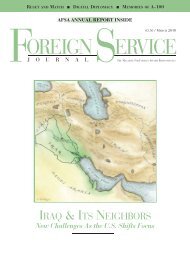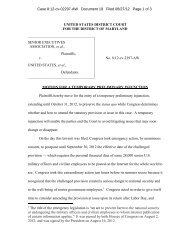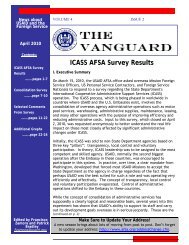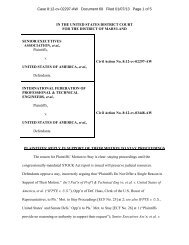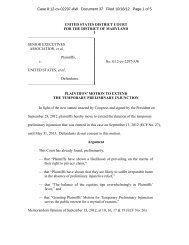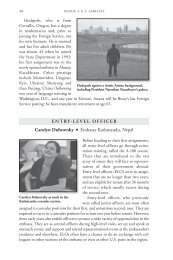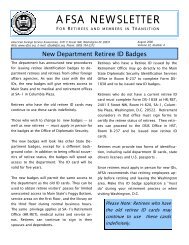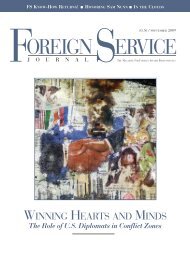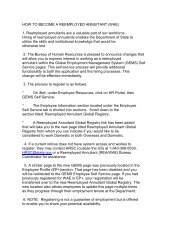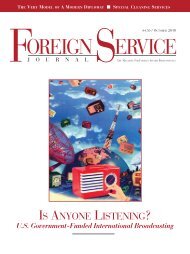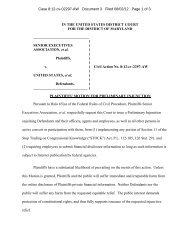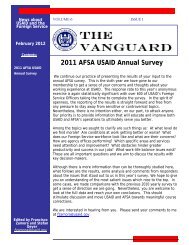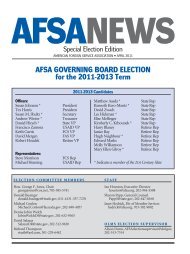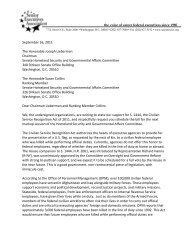F OCUS - American Foreign Service Association
F OCUS - American Foreign Service Association
F OCUS - American Foreign Service Association
You also want an ePaper? Increase the reach of your titles
YUMPU automatically turns print PDFs into web optimized ePapers that Google loves.
Durand Line broke the region’s dominant Pashtun ethnic<br />
group in two, creating a Pashtun-majority Afghanistan and<br />
assigning a large portion of the Pashtun-populated areas<br />
to what was then British India.<br />
Kabul refuses to recognize such a border and maintains<br />
a longstanding claim to the Pashtun territories within<br />
Pakistan (the North West Frontier Province, the Federally<br />
Administered Tribal Areas and parts of Baluchistan).<br />
Islamabad, for its part, denounces Afghan claims as unacceptable:<br />
not only would they deprive Pakistan of part of its<br />
territory, but could also open a Pandora’s box of competing<br />
ethnic identities and nationalisms.<br />
This so-called “Pashtunistan issue” becomes even<br />
more crucial for Islamabad when seen within the context<br />
of the larger South Asian security complex, in particular<br />
Pakistan-India relations. Since partition of the subcontinent<br />
in 1947, the disputed Kashmir border has been the<br />
source of three wars and nearly uninterrupted tension<br />
between Pakistan and its larger neighbor. The perceived<br />
threat from India has been an important driver of<br />
Pakistan’s policy toward Afghanistan.<br />
New Delhi enjoyed good relations with all Afghan governments,<br />
irrespective of their political affiliations, from<br />
1947 until the fall of the Burhanuddin Rabbani government<br />
in September 1996. In light of this, from 1947 to<br />
1979 Pakistan was essentially on the defensive, and relations<br />
between Islamabad and Kabul experienced several<br />
severe crises. Diplomatic relations were even severed for<br />
a brief period, and were resumed only when the shah of<br />
Iran mediated a rapprochement.<br />
In 1979, however, the Soviet invasion provided<br />
Islamabad with an opportunity to reverse Afghan claims to<br />
the Pashtun territories inside Pakistan and, with the support<br />
of the international community, try to install a more<br />
friendly government in Kabul. Thus, as part and parcel of<br />
the jihad against the Soviet occupation of Afghanistan,<br />
began Islamabad’s use of the border region for asymmetric<br />
warfare, the preference given to the Pashtun resistance<br />
groups and later, in the vacuum left after the Soviets’ 1989<br />
defeat, Pakistan’s support to the Taliban.<br />
In 1996, when the Taliban assumed power in Kabul,<br />
and India declined to recognize the new government,<br />
Delhi’s influence was marginalized. But after the Taliban’s<br />
overthrow in 2001 and India’s return to the Afghan scene,<br />
Pakistan began to fear that New Delhi’s renewed presence<br />
would reactivate the Afghan claim to “Greater<br />
Pashtunistan.”<br />
42 FOREIGN SERVICE JOURNAL/JULY-AUGUST 2008<br />
F <strong>OCUS</strong><br />
Islamabad and New Delhi soon began trading accusations<br />
of sabotage and terrorism. Pakistan, in particular,<br />
accused India of fomenting trouble in Waziristan and<br />
Baluchistan from its consulates placed along the border<br />
and of placing troops in Afghanistan. As late as July 2006,<br />
fully five years after the formation of the International<br />
Security Assistance Force, the Pakistani press was still<br />
speaking of “unconfirmed reports” that New Delhi was<br />
ready to send troops to join the peacekeeping effort in<br />
Afghanistan at the request of the U.S., NATO and the<br />
European Union.<br />
If the rhetoric about the Indian consulates in<br />
Afghanistan and their supposed role in covert destabilization<br />
operations in Pakistan has diminished, the mistrust<br />
between the two countries persists. Given Islamabad’s<br />
continued refusal to grant India the transit rights that<br />
would allow Afghanistan to benefit from trade and assistance<br />
from India, it is reasonable to assume that Pakistan<br />
is not ready to accept an Indian presence on both its western<br />
and eastern borders.<br />
The U.S. Factor<br />
Ironically, the continuation of a U.S. role and, more<br />
generally, an international presence in Afghanistan is a<br />
major Pakistani objective. And this helps explain Islamabad’s<br />
continued support of the Taliban. Because it was<br />
never able to secure automatic <strong>American</strong> protection in<br />
case of a conflict with India and is, moreover, convinced<br />
that the U.S. will leave Afghanistan as soon as the situation<br />
allows, Pakistan has to preserve its status as a front-line<br />
state for as long as possible, while at the same time minimizing<br />
the risks inherent in such a situation.<br />
Perpetuation of a low-intensity conflict in Afghanistan,<br />
coupled with maintenance of indigenous Pakistani terrorist<br />
organizations with an international reach, gives<br />
Islamabad long-term bargaining power with the U.S. and<br />
its allies. As long as <strong>American</strong> and NATO forces are present<br />
in Afghanistan, no regional power, in particular India,<br />
can develop a significant influence in the country. This is<br />
not Pakistan’s sole motivation; nor does it make Islamabad<br />
the only party responsible for the current impasse in<br />
Afghanistan. It is, nevertheless, an obvious consequence<br />
of Pakistan’s involvement in Afghan affairs and part of<br />
Islamabad’s strategic calculations in the region.<br />
Washington’s attempts to promote confidence-building<br />
measures between Pakistan and Afghanistan — in particular,<br />
the Tripartite Commission, composed of senior mili-


